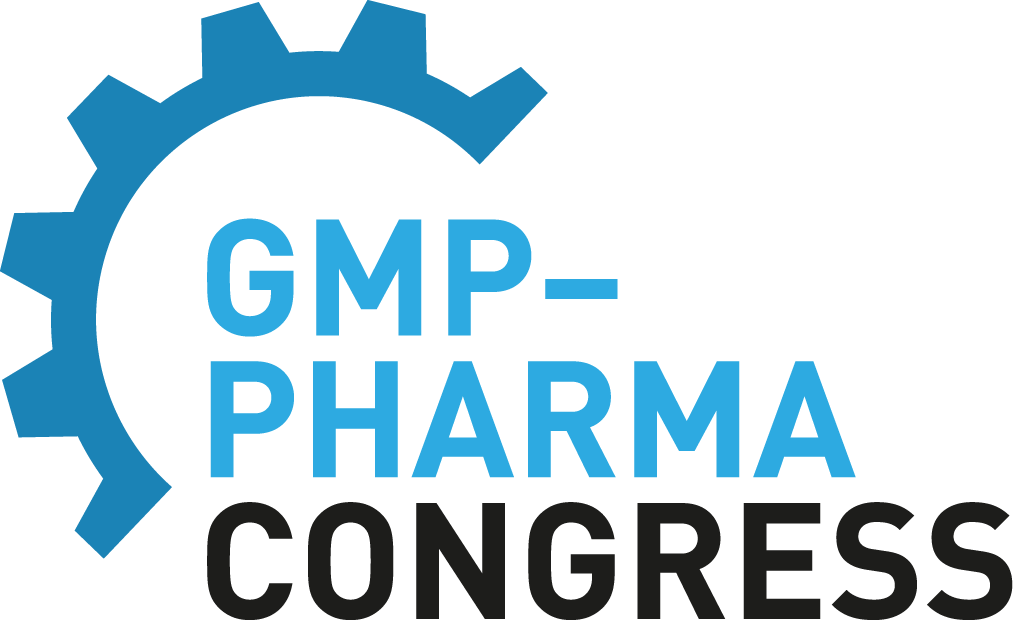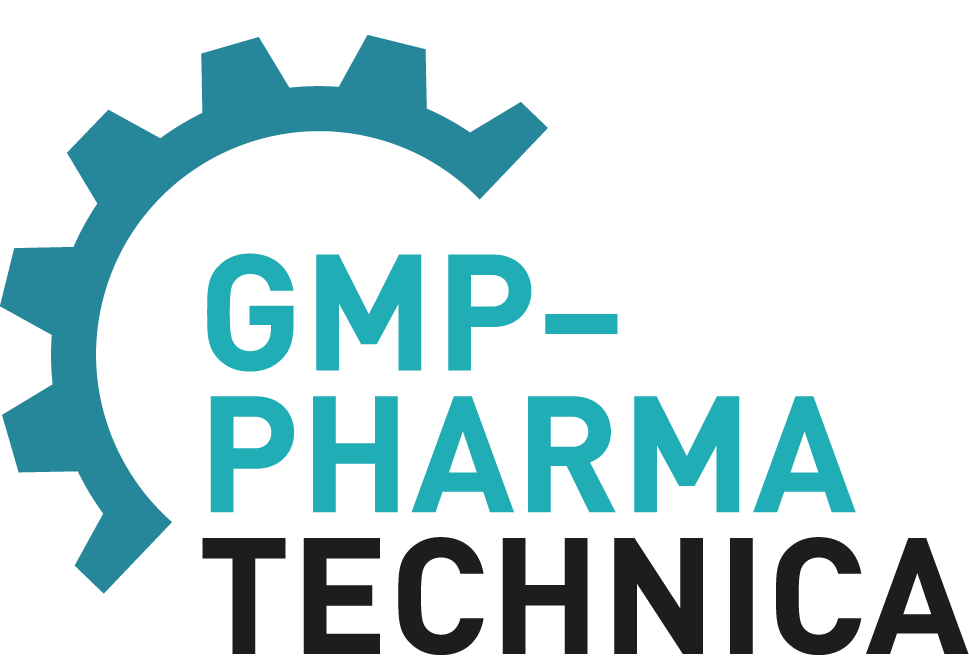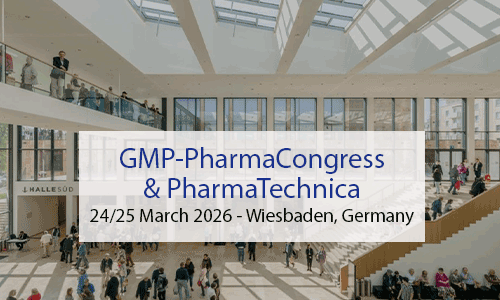Best Practice - Case Studies from the User for the User
With its move to the RheinMain CongressCenter in Wiesbaden, the PharmaCongress has become a completely new event, reaching its next level. While the heart of the congress are still the conference tracks - every year addressing latest issues and challenges and bringing together representatives from authorities and industry to discuss them in depth - the focus is even more on the users' experience by #sharing challenges and solutions in practice. The spotlight at PharmaCongress & PharmaTechnica Expo 2026 will thus be again on case studies from pharmaceutical companies, allowing delegates to directy benefit from the speakers' everyday practice and from the direct personal exchange.
The following sessions will be offered at the next PharmaCongress on 24/25 March 2026:
- Keynote Presentations
- European Aseptic Technologies & Annex 1 Conference
- Digital Transformation & Artificial Intelligence
- Trends in Barrier Systems & Robotics
- GMP-compliant Clean Rooms and Facilities
- ATMP - Hurdles and Achievements in Quality and Safety
- GMP for Prefilled Syringes
- GMP Requirements and Challenges for RTU/RTS Material
- European Microbiology Jubilee Conference
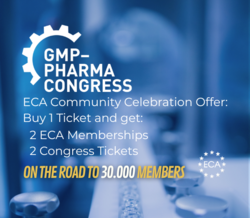
2 for 1: Get 2 tickets for the price of 1 and a free ECA membership for all participants on top
Agenda
Review PharmaCongress 2025

The annual PharmaCongress & PharmaTechnica took place for the 27th time, this year on April 8 and 9. Around 1.100 congress participants and exhibition visitors per day attended the presentations by 126 specialist speakers in 8 conference tracks and the 16 live demonstrations in the expo hall. The two key notes “Artificial Intelligence (AI) in Manufacturing and Quality at Sanofi” by Dr Maite Durrenbach, Chief Quality Officer, Sanofi and “ Pharmaceutical Manufacturing Reinvented: The 3D Printing Process and other New Technologies” by Dr Ranjita Shegokar Sahoo, Chief Pharma Innovation Officer (CPO), DiHeSys, received particular attention.
Conference Track on ATMPs
In addition to the established conference tracks on aseptic production, barrier systems and digitalization/AI, there was a whole series of other conference tracks – and one of them the conference “ATMP - Hurdles and Achievements in Quality and Safety”. It featured presentations on current challenges and advances in ATMPs. Leading experts from industry, authorities and science provided insights into regulatory processes, such as an application for approval from the EMA, GMP inspections and quality controls – for example for mRNA vaccines or viral vectors. Other topics included the production of innovative exosome therapies, industrial bacteriophage production, modern aseptic filling for small batches and particle control in cell therapies. The focus was also on technological developments such as modular designs.
Single-Use Technology
In the conference track “Single-Use Systems in Sterile & Biomanufacturing”, participants benefitted from a comprehensive insight into current trends and practical applications of single-use technologies in pharmaceutical production. Speakers from authorities, the pharmaceutical industry and universities presented numerous case studies that illustrated how single-use solutions can be successfully integrated from the upstream area through to the final fill & finish. A key topic was compliance with GMP requirements and how the revised EU Annex 1 affects single-use systems, such as the implementation of PUPSIT with single-use technology. The event made it clear that single-use concepts are becoming increasingly important in terms of flexibility and efficiency – provided that single-use manufacturers and users are in close contact to ensure the quality of both the SU systems and the products produced in them.
New Topic: Medicinal Cannabis
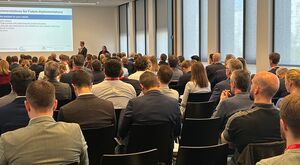
A new topic at the PharmaCongress was medical cannabis. This is approved for prescription in several countries around the world. People often ask what exactly is medicinal cannabis, and does EU GMP Part 1 (pharmaceutical production) or Part 2 (active ingredient production) apply here? Or when exactly does GACP and GMP apply?
At the conference questions like these as well as the EU GMP Annex 7 for the production of herbal medicinal products and the EMA GACP guideline for “Good agricultural and collection practice of starting materials of herbal origin” were discussed – just like the GMP-compliant drying of cannabis flowers to prevent mold growth and decontamination procedures. Another relevant topic was the new Ph. Eur. Monograph for cannabis flowers, which replaces the DAB monograph. It finally sets a uniform European quality standard. However, a uniform EU standard for cannabis extracts does not yet exist.
Cleanrooms Issues in daily Operations
The new series of lectures on cleanrooms in day-to-day operations was characterized by presentations on very different topics, all of which had a high practical relevance. Theory – regulations – and the reference to everyday life in the cleanroom were the common thread running through all the presentations. One highlight was the presentation by Dr Hans-Joachim Anders from Novartis on the subject of disinfection and surfaces. Not only because the audience was able to experience that he presented the topic in a comprehensive and comprehensible manner, but also because he was able to question or refute some of the theses.
Sustainability
This conference track took a closer look at the possibilities of sustainability, environmental thinking and energy savings, also under GMP conditions. The presentations included impressive technical case studies, e.g. by PSM Saar/PeterGroß Consulting, Refolution/Abbvie and Hof Anlagenbau/Roche, as well as the presentation by Gabriele Brutscher and Dr Marius Beyersdorf, Pekana, who outlined their company's holistic sustainability concept.
Professor Wallhäußer Innovation Award 2025 presented
In memory of Professor Wallhäußer's outstanding achievements in pharmaceutical quality assurance, Concept Heidelberg has been presenting the Professor Wallhäußer Award since 1987. It is endowed with 5,000 EUR.
In order to take current and future topics such as sustainability, cost efficiency and the use of artificial intelligence into account, the award was realigned in 2024 and received a new focus: innovations in pharmaceutical manufacturing. The new Professor Wallhäußer Innovation Award, which has been presented at the PharmaCongress 2025 for the second time, is intended to honor projects or technical solutions that stand out for their innovation and offer practical solutions for the future.
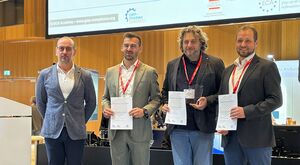
A total of 14 projects were submitted for the Innovation Award 2025, from which the jury selected three finalists. In recognition of the project “Production of Small-Volume Batches using the Low Pressure Fluid Transfer System ‘Sartophague’, the Innovation Award 2025 went jointly to Roche Diagnostics and Sartorius Stedim Italy. For the jury, this proposal represented the best combination of technical innovation and process simplification. Second place was awarded to WILCO for their project “Automated visual inspection for small scale production” and third place to KyooBe Tech for their project “eFIT Platform – a ground-breaking Solution for Pathogen Inactivation in Vaccine Production”.
